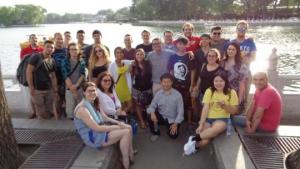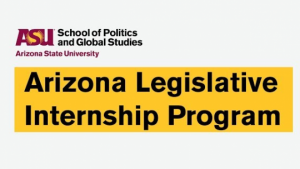About internships
What is an internship?
Answer: Internships provide valuable opportunities for students to gain experience in their field of study, assist them in determining whether they really have an interest in a particular career path, and create a network of contacts.
Where can I find out more about internships?
ASU Career Services ASU Global Education Office
Can I earn School of International Letters and Cultures college credit for an internship?
Earning college credit for an internship depends on the internship.
In general, FRE, GER, SPA Internships require at least 50 percent of the internship be conducted in that language.
For FLA Internships: Internships in languages other than FRE, GER or SPA and/or where English is the dominant language spoken. If you have an internship in mind and want to know whether you can earn college credit for your internship please contact a School of International Letters and Cultures advisor.
Advice on internships
More about internships
An internship in college goes a long way, helping students network and develop professional skills. Unfortunately, just one internship experience may not set you apart anymore.
Internships are ubiquitous and expected. The National Association of Colleges and Employers estimated that 65% of bachelor’s degree graduates from the Class of 2015 could put an internship on their resume.
Fortunately, students at the School of International Letters and Culture are exceptional, and with a few pointers you can get great internships, and in turn get great jobs.
Network (and advertise your language skills)
Did you know that Linkedin is available in 20 different languages? 70% of LinkedIn’s 433 million users are based outside of the United States, which means you can connect with professionals in 200 countries.
There are all kinds of tricks to maximize your profile and get seen, but you have a local network too. ASU Career Services lists internships and jobs both on and off campus. Working with alumni might give you a leg up, and knowing another language makes you a valuable addition.
Beyond official networking, you can reach out to coworkers and professionals and ask to get coffee. Use this as a learning opportunity in a less formal setting. You can also ask them to make introductions to other people in the field you’re interested in. There are right and wrong ways to do this, but guidance is never a bad thing.
Know where to look
Getting suggestions from people in your network is great, but a lot of websites will enable you to find and explore career options. We’ve already talked about LinkedIn, where companies do list internships, but some websites specialize in job finding.
Indeed.com enables you to set a filter for entry-level jobs and internships in a city of your choice. You can filter further by word choice. Idealist.org has hundreds of listings, many of which come from the nonprofit and NGO world. Some are even international, and the site is available in Spanish and French. The best part about Idealist though? You can filter out unpaid internships.
If you can, get an internship abroad
During the 2014/2015 academic year, only 313,415 U.S. students studied abroad. That’s less than 2% of of U.S. students enrolled in college. Besides being an incredible opportunity, studying abroad will set you apart when applying for jobs. Imagine elevating that distinction with an internship.
ASU has a number of study abroad opportunities. There are summer opportunities as well, including eight led by SILC faculty. When choosing your program, see which ones will help you coordinate an internship, and talk with an advisor about setting one up independently.
Intern more than once
Many colleges at ASU have internship requirements, which means there’s no excuse not to fit one into your schedule.
That being said, there’s nothing wrong with adding an internship on your own time. Use nifty classes like IDS 484 to earn credits for an internship while working around major requirements. Need more incentive? One study found that 63% of college grads who had a paid internship get offered a job within six months of graduating. It might be easier to get a paid internship with previous experience already.
For all the professional benefits an internship presents, they can also be rewarding, exciting experiences. Working in your desired field will give you a sense of what you want and what you need to get there. Interning during the summer may present the chance to travel nationally or internationally. You’ll make friends with people who share your passions. You may not need an internship to graduate, but you may be better off.
Local internships
Phoenix’s Japanese Friendship Garden
This internship (JPN 484) allows Japanese majors and minors to earn university credit while gaining valuable work-related experience, forging professional connections, and improving their Japanese language skills. Enrollees spend ~10 hours a week on-site at Phoenix’s Japanese Friendship Garden (Rōhōen): an emblem of Phoenix’s long-standing relationship with the city of Himeiji, Japan, and an important hub of Japan-related cultural activities in the metropolitan area. Students’ work at the garden is complemented by an independent research project, completed under the supervision of an advisor in SILC. Students interested in our internship program should contact William C. Hedberg at [email protected].
French immersion program for elementary students (K–5th grade)
Interns will work alongside the French teachers in the classroom, and will not be expected to lead classes on their own. Archway’s French teachers will prepare the lesson plans, although the interns may be able to prepare some plans as well if they are interested and the schedule allows. Lesson plans must first be approved by the Archway French teachers. Interns will speak in French and participate in small group work and other activities; they will not help just with classroom management. Students receive 3 hours of FRE 484 internship credit; the internship is not paid. Two internships are offered in both the Fall and Spring semesters. Applicants for the Archway French teaching internship must be taking French courses at the 300 or 400 level during the semester of the internship. Applicants must submit 1) a transcript; and 2) one letter of recommendation from a French instructor. Application materials should be sent to Mark Cruse ([email protected]). Applicants who pass the first review will be expected to conduct a virtual interview with Archway teachers and administrators for French language assessment.
Internships abroad
The SITE Program in Lombardy
The SITE Program (Study, Intercultural Training and Experience) is a paid internship program for English Teaching Assistants in the schools of Lombardy, Italy. It is an excellent opportunity for students or new graduates who wish to get a better understanding of the Italian language and culture while assisting the Italian teachers in their work. The program, established in 2005, promotes linguistic and intercultural exchange within Europe and across the globe. The program is open to B.A. students who are currently completing or have recently completed (within the last 18 months) college level Italian language and culture programs.
North American Language and Culture Assistants in Spain
Would you like to spend a school year in Spain? Getting to know its culture and people while improving your Spanish and collaborating with other foreign language teachers in school tasks? The Language and Culture Assistants program is coordinated by the Spanish Ministry of Education in collaboration with the Spanish Comunidades Autónomas (regions) and the Education Offices of the Embassies of Spain in the United States and Canada. It gives Junior and Senior College students as well as College Graduates an opportunity to visit Spain and become acquainted with the Spanish education system, teachers and students, while sharing with them aspects of their own language and culture.
Edulingua in San Severino Marche, SILC
Through our school’s partnership with Edulingua in San Severino Marche, SILC Italian students have the opportunity to study Italian intensively and participate in a semester-long internship in a beautiful city nestled in the foothills of the Apennines in central Italy. The program “English for baby, Italian for Teacher” provides ASU Italian students with one month (80 hours) of outstanding instruction in Italian in a nationally certified language program and free lodging as they are first trained and then work for two months (20 hours per week) as an assistant language instructor of English in a local school. Students can apply for either the fall or spring internships: October-December or January-March. Although preference is given to students with an Intermediate level of proficiency in Italian, it is open to any student who is studying Italian at ASU. For more information contact Alessandra Coderoni at [email protected] or contact Juliann Vitullo [email protected].
Sun Devils in Beijing: Internship and Study Abroad Program
This program is a month-long English-speaking internship program in Beijing, China where students are able to gain valuable work experience.
The program provides students an opportunity to gain valuable work experience, visit ancient historical sites, and learn about Chinese language and culture.
Deutscher Bundestag
Would you like to work at the German Parliament?
The German Bundestag invites you, in cooperation with the Freie Universität Berlin, Humboldt- Universität Berlin, and Technische Universität Berlin, to apply for an International Parliamentary Scholarship (IPS) to spend five months in Berlin. The IPS program is aimed at highly qualified young men and women who will return home after the program with the determination to play an active and responsible role in shaping their countries’ democratic future.
Domestic internships
Diplomat in Residence
Diplomats in Residence are career Foreign Service Officers located throughout the U.S. who provide guidance and advice on careers, internships, and fellowships to students and professionals in the communities they serve. Contact our representative, Antoinette Hurtado, for more details in careers and internship opportunities!
Virtual Student Foreign Service Program
U.S. citizen college students can make a real difference in the work of the U.S. government through the Virtual Student Foreign Service (VSFS). VSFS harnesses the expertise and digital excellence of U.S. citizen students to move the work of their government forward on multiple fronts. Since 2009, thousands of VSFS interns have expanded the efforts of the U.S. government around the world – from dorm rooms to libraries and coffee shops and more.
The Arizona Legislative and Government Internship Program
The Arizona Legislative and Government Internship Program is a competitive university-wide program that provides an opportunity to intern full-time at a state agency, the Arizona State Legislature, the Governor's Office, or the Arizona Supreme Court during spring semester. Participants receive a tuition and fee waiver, a stipend of approximately $5,000, and 12 undergraduate or 9 graduate internship credits.
For this competitive program, interns are placed in various agencies, the Arizona State Legislature, the Governor's Office, and the Arizona Supreme Court during the Spring semester.
Check out the roadmap or contact Gisela Grant for program details.










